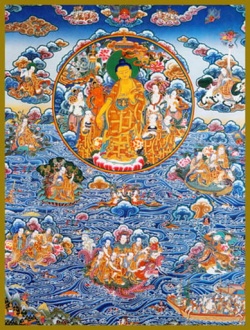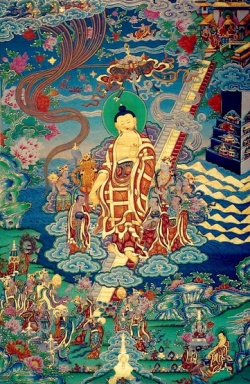Difference between revisions of "Tusita"
(Created page with "thumb|250px| <poem> "Joyful Land" in English, "Ganden" in Tibetan. The Pure Land of Buddha Maitreya. Both Je Tsongkhapa and Atisha went to this Pu...") |
|||
| Line 1: | Line 1: | ||
[[File:Tushita heaven.jpg|thumb|250px|]] | [[File:Tushita heaven.jpg|thumb|250px|]] | ||
<poem> | <poem> | ||
| − | "Joyful Land" in English, "Ganden" in Tibetan. The Pure | + | "Joyful Land" in English, "Ganden" in Tibetan. The [[Pure land]] of [[Buddha]] [[Maitreya]]. Both [[Je Tsongkhapa]] and [[Atisha]] went to this [[Pure land]] after they passed away. See [[Heart]] Jewel. |
| − | Added: 23.Nov.2008 | Source: Kadampa: Glossary of Buddhist Terms | + | Added: 23.Nov.2008 | Source: [[Kadampa]]: Glossary of Buddhist Terms |
Rating: - | Rating: - | ||
| − | One of the higher Kamadhatu Devas, among whom the future Maitreya lives: | + | One of the higher Kamadhatu Devas, among whom the future [[Maitreya]] lives: |
| − | Tusita is one of the six | + | Tusita is one of the six [[Deva]] worlds of the Kamadhatu, located between the [[Yama]] [[Heaven]] and the Nirmanarati [[Heaven]]. Like the other heavens, Tusita is said to be reachable through [[Meditation]]. It is the [[Heaven]] where the [[Bodhisattva]] Svetaketu ([[Pali]]: Setaketu, "White Banner") resided before being reborn on Earth as [[Gautama]], [[THE historical Buddha]]; it is, likewise, the [[Heaven]] where the [[Bodhisattva]] Natha ("Protector") currently resides, who will later be born as the next [[Buddha]], [[Maitreya]]. |
| − | Like all | + | Like all [[Heaven]] realms in [[Buddhism]], the Tusita [[Heaven]] is the residence of divine beings or devas, and represents one of the highest realms of sensual pleasure. According to an excerpt of the [[Pali]] Canon,] a [[Theravada]] Buddhist text, time runs much differently than on Earth: |
"That which among men is four hundred years, Visakha, is one night and day of the Tusita devas, their month has thirty of those days, their year twelve of those months; the lifespan of the Tusita devas is four thousand of those heavenly years..." | "That which among men is four hundred years, Visakha, is one night and day of the Tusita devas, their month has thirty of those days, their year twelve of those months; the lifespan of the Tusita devas is four thousand of those heavenly years..." | ||
| Line 15: | Line 15: | ||
| − | 1. Tusita - One of the palaces occupied by Konagamana Buddha in his last lay | + | 1. Tusita - One of the palaces occupied by [[Konagamana Buddha]] in his last lay [[Life]]. Bu.xxiv.18. |
[[File:Tushita000.jpg|thumb|250px|]] | [[File:Tushita000.jpg|thumb|250px|]] | ||
| − | 2. Tusita - The fourth of the six | + | 2. Tusita - The fourth of the six [[Deva]] worlds (A.i.210, etc.). |
| − | Four hundred years of human | + | Four hundred years of human [[Life]] are equal to one day of the Tusita [[World]] and four thousand years, so reckoned, is the term of [[Life]] of a [[Deva]] born in Tusita (A.i.214; iv.261, etc.). |
Sometimes Sakadagamins (e.g., Purana and Isidatta) are born there (A.iii.348; v.138; also DhA.i.129; UdA.149, 277). | Sometimes Sakadagamins (e.g., Purana and Isidatta) are born there (A.iii.348; v.138; also DhA.i.129; UdA.149, 277). | ||
| − | It is the rule for all Bodhisattas to be born in Tusita in their last | + | It is the rule for all Bodhisattas to be born in Tusita in their last [[Life]] but one; then, when the time comes for the appearance of a [[Buddha]] in the [[World]], the devas of the ten thousand [[World]] systems assemble and request the [[Bodhisatta]] to be born among men. Great rejoicings attend the acceptance of this request (A.ii.130; iv.312; DhA.i.69f; J.i.47f). |
| − | Gotamas name, while in Tusita, was Setaketu (Sp.i.161), and the Bodhisatta Metteyya (q.v.), the future Buddha, is now living in Tusita under the name of Nathadeva. | + | Gotamas name, while in Tusita, was Setaketu (Sp.i.161), and the [[Bodhisatta]] Metteyya (q.v.), the future [[Buddha]], is now living in Tusita under the name of Nathadeva. |
| − | The Tusita | + | The Tusita [[World]] is considered the most beautiful of the celestial worlds, and the pious [[Love]] to be born there because of the presence of the [[Bodhisatta]] (Mhv.xxxii.72f). |
Tusita is also the abode of each Bodhisattas parents (DhA.i.110). | Tusita is also the abode of each Bodhisattas parents (DhA.i.110). | ||
| − | The king of the Tusita | + | The king of the Tusita [[World]] is Santusita; he excels his fellows in ten respects - [[Beauty]], span of [[Life]], etc. (A.iv.243; but see Cv.lii.47, where the [[Bodhisatta]] Metteyya is called the chief of Tusita). |
| − | Among those reborn in Tusita are also mentioned Dhammika, Anathapindika, Mallika, the | + | Among those reborn in Tusita are also mentioned Dhammika, Anathapindika, Mallika, the [[Thera]] Tissa (Tissa 10), Mahadhana and Dutthagamani. |
| − | The Tusita devas are so called because they are full of | + | The Tusita devas are so called because they are full of [[Joy]] (tuttha hatthati Tusita) (VibhA.519; NidA.109). |
The inhabitants of Tusita are called Tusita. They were present at the Mahasamaya (D.ii.161). | The inhabitants of Tusita are called Tusita. They were present at the Mahasamaya (D.ii.161). | ||
| Line 41: | Line 41: | ||
-- or -- | -- or -- | ||
| − | The inhabitants of the Tusita | + | The inhabitants of the Tusita [[World]]. See Tusita(2). |
</poem> | </poem> | ||
{{R}} | {{R}} | ||
Revision as of 03:13, 25 April 2013
"Joyful Land" in English, "Ganden" in Tibetan. The Pure land of Buddha Maitreya. Both Je Tsongkhapa and Atisha went to this Pure land after they passed away. See Heart Jewel.
Added: 23.Nov.2008 | Source: Kadampa: Glossary of Buddhist Terms
Rating: -
One of the higher Kamadhatu Devas, among whom the future Maitreya lives:
Tusita is one of the six Deva worlds of the Kamadhatu, located between the Yama Heaven and the Nirmanarati Heaven. Like the other heavens, Tusita is said to be reachable through Meditation. It is the Heaven where the Bodhisattva Svetaketu (Pali: Setaketu, "White Banner") resided before being reborn on Earth as Gautama, THE historical Buddha; it is, likewise, the Heaven where the Bodhisattva Natha ("Protector") currently resides, who will later be born as the next Buddha, Maitreya.
Like all Heaven realms in Buddhism, the Tusita Heaven is the residence of divine beings or devas, and represents one of the highest realms of sensual pleasure. According to an excerpt of the Pali Canon,] a Theravada Buddhist text, time runs much differently than on Earth:
"That which among men is four hundred years, Visakha, is one night and day of the Tusita devas, their month has thirty of those days, their year twelve of those months; the lifespan of the Tusita devas is four thousand of those heavenly years..."
1. Tusita - One of the palaces occupied by Konagamana Buddha in his last lay Life. Bu.xxiv.18.
2. Tusita - The fourth of the six Deva worlds (A.i.210, etc.).
Four hundred years of human Life are equal to one day of the Tusita World and four thousand years, so reckoned, is the term of Life of a Deva born in Tusita (A.i.214; iv.261, etc.).
Sometimes Sakadagamins (e.g., Purana and Isidatta) are born there (A.iii.348; v.138; also DhA.i.129; UdA.149, 277).
It is the rule for all Bodhisattas to be born in Tusita in their last Life but one; then, when the time comes for the appearance of a Buddha in the World, the devas of the ten thousand World systems assemble and request the Bodhisatta to be born among men. Great rejoicings attend the acceptance of this request (A.ii.130; iv.312; DhA.i.69f; J.i.47f).
Gotamas name, while in Tusita, was Setaketu (Sp.i.161), and the Bodhisatta Metteyya (q.v.), the future Buddha, is now living in Tusita under the name of Nathadeva.
The Tusita World is considered the most beautiful of the celestial worlds, and the pious Love to be born there because of the presence of the Bodhisatta (Mhv.xxxii.72f).
Tusita is also the abode of each Bodhisattas parents (DhA.i.110).
The king of the Tusita World is Santusita; he excels his fellows in ten respects - Beauty, span of Life, etc. (A.iv.243; but see Cv.lii.47, where the Bodhisatta Metteyya is called the chief of Tusita).
Among those reborn in Tusita are also mentioned Dhammika, Anathapindika, Mallika, the Thera Tissa (Tissa 10), Mahadhana and Dutthagamani.
The Tusita devas are so called because they are full of Joy (tuttha hatthati Tusita) (VibhA.519; NidA.109).
The inhabitants of Tusita are called Tusita. They were present at the Mahasamaya (D.ii.161).
-- or --
The inhabitants of the Tusita World. See Tusita(2).

